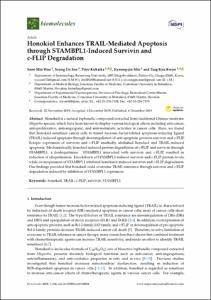Honokiol Enhances TRAIL-Mediated Apoptosis through STAMBPL1-Induced Survivin and c-FLIP Degradation
- Keimyung Author(s)
- Kwon, Taeg Kyu
- Department
- Dept. of Immunology (면역학)
- Journal Title
- Biomolecules
- Issued Date
- 2019
- Volume
- 9
- Issue
- 12
- Abstract
- Honokiol is a natural biphenolic compound extracted from traditional Chinese medicine Magnolia species, which have been known to display various biological effects including anti-cancer, anti-proliferative, anti-angiogenic, and anti-metastatic activities in cancer cells. Here, we found that honokiol sensitizes cancer cells to tumor necrosis factor-related apoptosis-inducing ligand (TRAIL)-induced apoptosis through downregulation of anti-apoptotic proteins survivin and c-FLIP. Ectopic expression of survivin and c-FLIP markedly abolished honokiol and TRAIL-induced apoptosis. Mechanistically, honokiol induced protein degradation of c-FLIP and survivin through STAMBPL1, a deubiquitinase. STAMBPL1 interacted with survivin and c-FLIP, resulted in reduction of ubiquitination. Knockdown of STAMBPL1 reduced survivin and c-FLIP protein levels, while overexpression of STAMBPL1 inhibited honokinol-induced survivin and c-FLIP degradation. Our findings provided that honokiol could overcome TRAIL resistance through survivin and c-FLIP degradation induced by inhibition of STAMBPL1 expression.
- Keimyung Author(s)(Kor)
- 권택규
- Publisher
- School of Medicine (의과대학)
- Citation
- Seon MinWoo et al. (2019). Honokiol Enhances TRAIL-Mediated Apoptosis through STAMBPL1-Induced Survivin and c-FLIP Degradation. Biomolecules, 9(12), E838–E838. doi: 10.3390/biom9120838
- Type
- Article
- ISSN
- 2218-273X
- Source
- https://www.ncbi.nlm.nih.gov/pmc/articles/PMC6995549/
- Appears in Collections:
- 1. School of Medicine (의과대학) > Dept. of Immunology (면역학)
- 파일 목록
-
-
Download
 oak-2019-0446.pdf
기타 데이터 / 3.46 MB / Adobe PDF
oak-2019-0446.pdf
기타 데이터 / 3.46 MB / Adobe PDF
-
Items in Repository are protected by copyright, with all rights reserved, unless otherwise indicated.